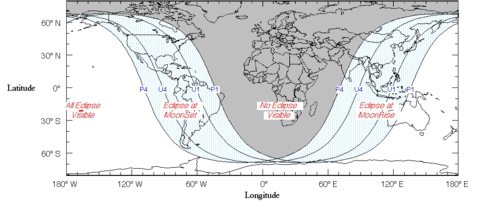June 2012 lunar eclipse
| Partial Lunar Eclipse 4 June 2012 | |
|---|---|
 From Brisbane, Australia, 11:06 UTC | |
 The moon passed partially into the northern umbral shadow of the Earth. | |
| Series (and member) | 140 (25 of 80) |
| Duration (hr:mn:sc) | |
| Partial | 2:06:35 |
| Penumbral | 4:30:02 |
| Contacts (UTC) | |
| P1 | 8:48:11 |
| U1 | 9:59:53 |
| Greatest | 11:03:12 |
| U4 | 12:06:28 |
| P4 | 13:18:13 |
 The moon's hourly motion across the Earth's shadow in the constellation of Ophiuchus (north of Scorpius) | |
A partial lunar eclipse took place on 4 June 2012. It was the first of two lunar eclipses occurring in 2012, the second eclipse set to happen on 28 November. The moon was about 37% covered by the Earth's northern umbral shadow at maximum eclipse.
Visibility[]
This lunar eclipse, occurring during June's "Strawberry" full moon[1] was completely visible over Australia, rising over eastern Asia and setting over western North America. New England and eastern Canada missed the entire eclipse since the event began after moonset in those regions. The eclipse was visible in the central United States.
Amongst those in North America, observers in western Canada and the USA had the best views with moonset occurring sometime after mid-eclipse.
 This simulation shows the earth at the time of greatest eclipse as viewed from the center of the moon. The sun is seen here as a partial solar eclipse over the Earth's north pole. |

Gallery[]

Elko, Nevada, 10:58 UTC

Redcliffe, Queensland, 11:06 UTC

Albuquerque, New Mexico, 11:20 UTC

Marikina, Philippines, 11:33 UTC
From Beijing at moonrise, 12:09 UTC

Time lapse image from Villa Gesell, Argentina
Related eclipses[]
Eclipses of 2012[]
- An annular solar eclipse on 20 May.
- A partial lunar eclipse on 4 June.
- A total solar eclipse on 13 November.
- A penumbral lunar eclipse on 28 November.
Lunar year (354 days)[]
This eclipse was one of five lunar eclipses in a short-lived series. The lunar year series repeats after 12 lunations or 354 days (Shifting back about 10 days in sequential years). Because of the date shift, the Earth's shadow will be about 11 degrees west in sequential events.
| Lunar eclipse series sets from 2009–2013 | ||||||||
|---|---|---|---|---|---|---|---|---|
| Ascending node | Descending node | |||||||
| Saros # Photo |
Date Viewing |
Type chart |
Gamma | Saros # Photo |
Date Viewing |
Type chart |
Gamma | |
| 110 | 2009 Jul 07
|
penumbral
|
-1.4916 | 115
|
2009 Dec 31
|
partial
|
0.9766 | |
120
|
2010 Jun 26
|
partial
|
-0.7091 | 125
|
2010 Dec 21
|
total
|
0.3214 | |
130
|
2011 Jun 15
|
total
|
0.0897 | 135
|
2011 Dec 10
|
total
|
-0.3882 | |
140
|
2012 Jun 04
|
partial
|
0.8248 | 145 | 2012 Nov 28
|
penumbral
|
-1.0869 | |
| 150 | 2013 May 25
|
penumbral
|
1.5351 | |||||
| Last set | 2009 Aug 06 | Last set | 2009 Feb 9 | |||||
| Next set | 2013 Apr 25 | Next set | 2013 Oct 18 | |||||
Half-Saros cycle[]
A lunar eclipse will be preceded and followed by solar eclipses by 9 years and 5.5 days (a half saros).[2] This lunar eclipse is related to two annular solar eclipses of Solar Saros 147.
| 31 May 2003 | 10 June 2021 |
|---|---|

|

|
See also[]
- List of lunar eclipses and List of 21st-century lunar eclipses
References[]
- ^ "Partial Eclipse of the Strawberry Moon". NASA. 28 May 2012. Retrieved 4 May 2020.
- ^ Mathematical Astronomy Morsels, Jean Meeus, p.110, Chapter 18, The half-saros
External links[]
| Wikimedia Commons has media related to Lunar eclipse of 2012 June 4. |
- 2012 Jun 04 chart: Eclipse Predictions by Fred Espenak, NASA/GSFC
- Hermit eclipse: 2012-06-04
- NightSkyInfo.com: Lunar Eclipse Monday, 4 June 2012
- 21st-century lunar eclipses
- 2012 in science
- June 2012 events
- Lunar eclipse stubs








